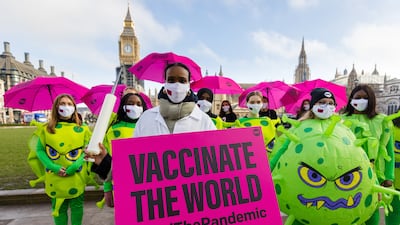Developing countries are facing mounting risks to their recovery from “financial fragility” post the coronavirus pandemic due to non-transparent debt, rising inflation and higher interest rates, the World Bank said.
High levels of non-performing loans and hidden debt are disproportionately reducing access to finance for low-income households and small businesses, the Washington-based lender said in its report titled World Development Report 2022: Finance for an Equitable Recovery.
These risks need to be addressed since the balance sheets of households, businesses, banks and governments across the world are tightly interconnected, it added.
“The risk is that the economic crisis of inflation and higher interest rates will spread due to financial fragility. Tighter global financial conditions and shallow domestic debt markets in many developing countries are crowding out private investment and dampening the recovery,” World Bank Group's president David Malpass said.
“It is critical to work towards broad-based access to credit and growth-orientated capital allocation. This would enable smaller and more dynamic firms — and sectors with higher growth potential — to invest and create jobs.”
The Covid-19 pandemic has led to the largest global economic crisis in more than a century, resulting in major setbacks to growth, increased poverty rates and widened inequality.
Governments reacted by rolling out large and unprecedented emergency support measures, which helped mitigate some of the social and economic effects, and increased sovereign debt levels — already at record highs in many countries before the pandemic.
The response also exposed several challenges with private debt that must now be urgently addressed — including a lack of transparency in reporting non-performing loans, delayed management of distressed assets and tighter or no access to credit for the most vulnerable households and businesses, the World Bank said.
Early detection of financial risks is among the top priorities for action highlighted in the report.
Surveys of businesses in developing countries during the pandemic found that 46 per cent expect to fall into arrears, according to the World Bank.
Loan defaults could now sharply increase and private debt could quickly become public debt as governments provide support, it predicted.
World Bank Group's president
With many households and firms facing unsustainable levels of debt due to lower income, the report called for the proactive management of distressed loans.
Improving insolvency mechanisms, facilitating out-of-court workouts, especially for small businesses, and promoting debt forgiveness can help enable the orderly reduction of private debts, it said.
On the other hand, despite the severe contraction in incomes and business revenue, the share of non-performing loans remains largely below expectations.
“However, this may be due to forbearance policies and relaxed accounting standards that are masking significant hidden risks that will become apparent only as support policies are withdrawn,” the report said.
“Prior to crises, it’s often the things that you don’t see that ultimately get you. There is reason to expect that many vulnerabilities remain hidden,” Carmen Reinhart, senior vice president and chief economist of the World Bank Group, said.
“It’s time to prioritise early, tailored action to support a healthy financial system that can provide the credit growth needed to fuel recovery. If we don’t, it is the most vulnerable that would be hit hardest.”
In low-income countries, dramatically increased levels of sovereign debt need to be proactively managed in an orderly and timely manner, the report said.
It also called for work towards inclusive financial access to support economic recovery. In low- and middle-income countries, 50 per cent of households are unable to sustain basic consumption beyond three months.
"Households and small businesses have been at greatest risk of being cut off from credit, yet access to credit improves the resilience of low-income households and enables small businesses to navigate shutdowns, stay in business, and eventually grow and support the recovery,” the World Bank said.
The World Bank Group provided more than $157 billion in financing to developing countries between April 1, 2020 and June 30, 2021 to support their recovery.
Digital financial tools and products can play a critical role in assessing borrower risk and providing recourse in the event of default, thereby improving management of credit risk.
The policy reforms necessary for achieving an equitable recovery also offer governments and regulators an opportunity and roadmap to accelerate the shift towards a more efficient and sustainable world economy, the lender said.
“Climate change is a major source of neglected risk in the world economy,” the report said. “Well-designed crisis response policies and longer-term reforms can encourage capital flows towards greener firms and industries.”


